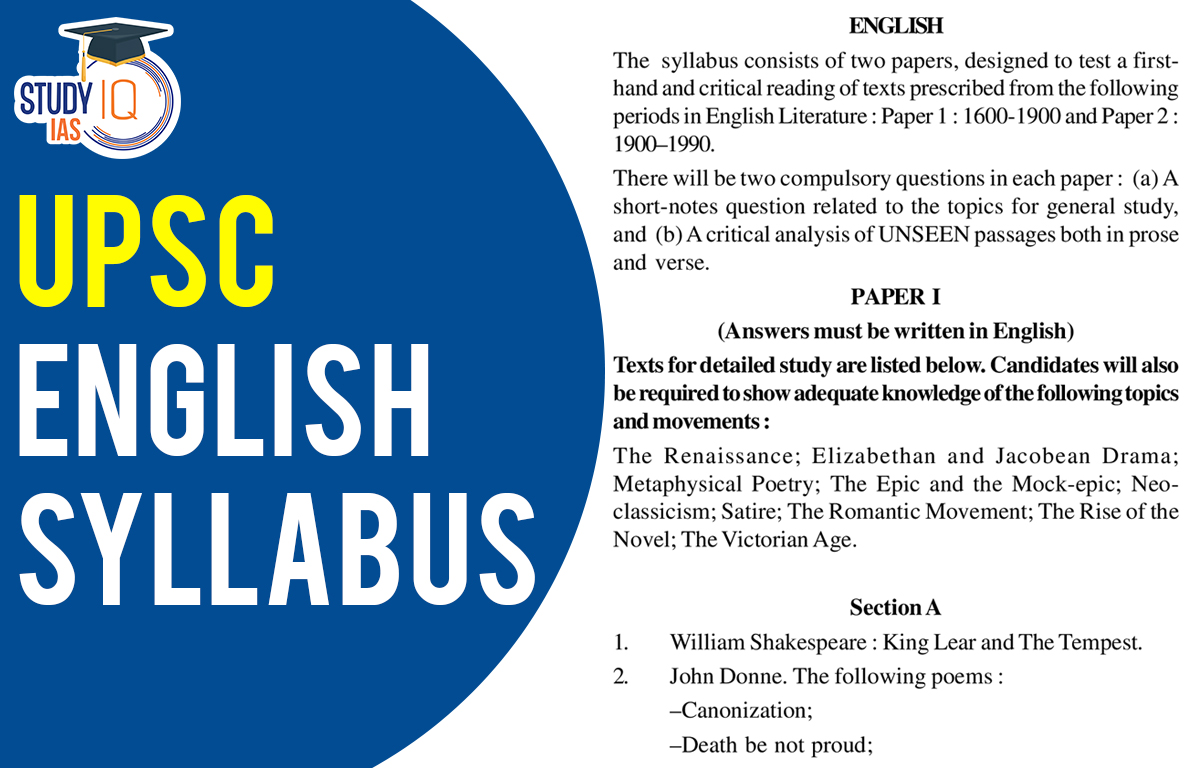UPSC mains exam, candidates have to select one optional topic. It is very important in determining an aspirant’s ranking in the IAS Examination. English is an optional subject in the UPSC Civil Services Examination. The syllabus for English Literature for UPSC Mains is extensive. It includes literature from the mediaeval and early modern periods as well as modern English from 1900 AD onwards. English is also one of the required language papers in the UPSC Mains. You can find the UPSC English Literature Syllabus in this article. This article provides you with complete information regarding the UPSC English syllabus that’s required to prepare for the UPSC Syllabus
UPSC English Literature Syllabus
The English Literature Syllabus is quite extensive, and it encompasses literature from the mediaeval and early modern periods. The UPSC English literature optional syllabus includes topics such as William Shakespeare’s King Lear and The Tempest, John Milton’s Paradise Lost, I, II, IV, IX, Alexander Pope’s The Rape of the Lock, and many others. Applicants with a strong English background and an interest in novels and poetry should consider taking this as an elective. Aspirants studying for the English Literature UPSC Syllabus must be familiar with the detailed syllabus in order to plan their preparation strategically. Paper 1 and Paper 2 carry 250 marks each and the total marks are 500.
| English Literature Syllabus | Topics |
| English Literature Syllabus Paper 1 | Section A:
William Shakespeare, John Donne, William Wordsworth, Henrik Ibsen: A Doll’s House. Section B: Jonathan Swift, Gulliver’s Travels, Jane Austen. Pride and Prejudice, Henry Fielding. Tom Jones, Charles Dickens. Hard Times, George Eliot. The Mill on the Floss, Thomas Hardy. Tess of the d’Urbervilles Mark Twain. The Adventures of Huckleberry Finn |
| English Literature Syllabus Paper 2 | Section A:
Authors such as William Butler Yeats, T.S. Eliot, W.H. Auden, John Osborne: Look Back in Anger, Samuel Beckett. Waiting for Godot, Philip Larkin. Section B: Joseph Conrad. Lord Jim, James Joyce. Portrait of the Artist as a Young Man, D.H. Lawrence. Sons and Lovers, E.M. Forster. A Passage to India, Virginia Woolf. Mrs. Dalloway, Raja Rao, Kantha Pura, V.S. Naipaul. A House for Mr. Biswas. |
UPSC English Syllabus Paper 1
It is vital to understand that Paper 1 of the UPSC English Syllabus consists of six themes that are further divided into subtopics.
Section A:
- William Shakespeare: King Lear and The Tempest
- John Donne. The following poems :
- Canonization
- Death be not proud
- The Good Morrow
- On his Mistress going to bed
- The Relic
- John Milton: Paradise Lost, I, II, IV, IX
- Alexander Pope. The Rape of the Lock
- William Wordsworth. The following poems
- Ode on Intimations of Immortality
- Tintern Abbey
- Three years she grew
- She dwelt among untrodden ways
- Michael
- Resolution and Independence
- The World is too much with us
- Milton, thou shouldst be living at this hour
- Upon Westminster Bridge
- Alfred Tennyson: In Memoriam
- Henrik Ibsen: A Doll’s House
Section B:
- Jonathan Swift. Gulliver’s Travels
- Jane Austen. Pride and Prejudice
- Henry Fielding. Tom Jones
- Charles Dickens. Hard Times
- George Eliot. The Mill on the Floss
- Thomas Hardy. Tess of the d’Urbervilles
- Mark Twain. The Adventures of Huckleberry Finn
UPSC English Syllabus Paper 2
Remember that in their UPSC English Optional Syllabus, paper 2 includes a total of 6 topics that are further classified into subtopics.
Section A:
1. William Butler Yeats. The following poems:
– Easter 1916
– The Second Coming
– A Prayer for my Daughter
– Sailing to Byzantium
– The Tower
– Among School Children
– Leda and the Swan
– Meru
– Lapis Lazuli
– The Second Coming
– Byzantium
2. T.S. Eliot. The following poems:
– The Love Song of J.Alfred Prufrock
– Journey of the Magi
– Burnt Norton
3. W.H. Auden. The following poems:
– Partition
– Musee des Beaux Arts
– In Memory of W.B. Yeats
– Lay your sleeping head, my love
– The Unknown Citizen
– Consider
– Mundus Et Infans
– The Shield of Achilles
– September 1, 1939
– Petition
4. John Osborne: Look Back in Anger
5. Samuel Beckett. Waiting for Godot
6. Philip Larkin
– Next
– Please
– Deceptions
– Afternoons
– Days
– Mr. Bleaney
7. A.K. Ramanujan
– Looking for a Causim on a Swing
– A River
– Of Mothers, among other Things
– Love Poem for a Wife 1
– SamllScale Reflections on a Great House
– Obituary
Section B:
- Joseph Conrad. Lord Jim.
- James Joyce. Portrait of the Artist as a Young Man.
- D.H. Lawrence. Sons and Lovers.
- E.M. Forster. A Passage to India.
- Virginia Woolf. Mrs. Dalloway.
- Raja Rao. Kanthapura.
- V.S. Naipaul. A House for Mr. Biswas.
This article discusses the complete UPSC English Syllabus for UPSC. Candidates can download the PDF in this article. For more details related to UPSC Examination; students can visit the official website of StudyIQ UPSC Online Coaching.


 Daily Quiz 16 April 2025
Daily Quiz 16 April 2025
 Bhashanet Portal : Empowering Multilingu...
Bhashanet Portal : Empowering Multilingu...
 Soyuz Aircraft: History, Design and Sign...
Soyuz Aircraft: History, Design and Sign...





















